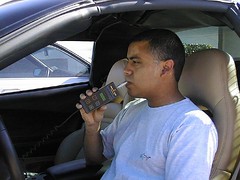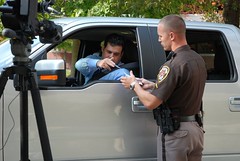On May 24, 2011, the Court of Appeals decided Commonwealth v. Virgilio, holding that a paved driveway between two houses that neither contained nor led to businesses or public accommodations was, as a matter of law, not a way or place to which the public had access as invitees or licensees within the meaning of Massachusetts OUI statutory language.
In order to be convicted of operating under the influence, the government is required to prove that a defendant was operating on a public way, in a place where the public has a right of access, or in a place where members of the public have access as licensees or invitees. In Virgilio, the Appeals Court explained that in determining whether a private way is covered by the statute, the way’s physical characteristics and circumstances are to be assessed. The court is to determine whether members of the public would reasonably think that the way is open to invitees or licensees. The objective appearance of the way, and not the intent of the owner of the property, is controlling. Things like curbs and street lights are some characteristics that may indicate that a way is accessible to the public. However, the court acknowledged that these characteristics are not dispositive because public roads in rural areas often lack them.
The court decided that the private driveway in Virgilio was not a way or a place to which the public had access as licensees or invitees, even though it was not gated, because it only served two residential buildings and did not lead to any public businesses. To conclude otherwise, the court noted, would be to render the word “public” superfluous and depart from the legislative intent of the statute.
The dissent was of the opinion that the driveway did fall within the meaning of the statute, focusing the analysis on the probable and foreseeable “aggregation of persons.” The dissenting judge noted that a drunk driver could be expected to encounter both residents and visitors in the driveway, given its common character.
Read Full Text Of Opinion:
 Massachusetts DUI Lawyer Blog
Massachusetts DUI Lawyer Blog



 A recent article in the Boston Globe got my attention as a
A recent article in the Boston Globe got my attention as a  Prospective employers, dates, coworkers and friends can find information about most of us online. Unfortunately, that can include news reports about our misdeeds and mistakes. A number of candidates who ran for office this year have learned this the hard way, from Delaware Senate candidate Christine O’Donnell’s claims to have been involved with witchcraft to Massachusetts Republican Jon Golnik’s OUI arrest in 2001. As a
Prospective employers, dates, coworkers and friends can find information about most of us online. Unfortunately, that can include news reports about our misdeeds and mistakes. A number of candidates who ran for office this year have learned this the hard way, from Delaware Senate candidate Christine O’Donnell’s claims to have been involved with witchcraft to Massachusetts Republican Jon Golnik’s OUI arrest in 2001. As a  Those of us who followed the progress of the
Those of us who followed the progress of the